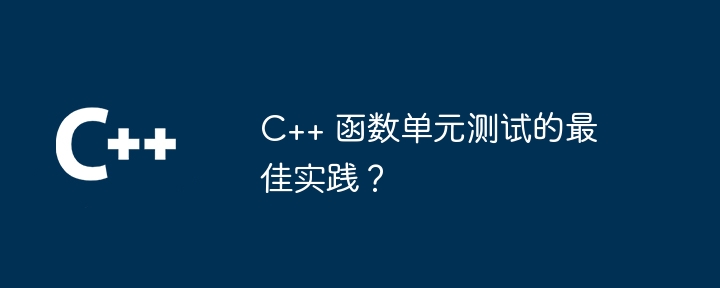
Using best practices such as C testing framework, AAA pattern, assertion library, mocks/stubs, etc., you can write reliable and efficient unit tests, including isolating tests, using assertions to clearly express expected behavior, and replacing or extending external dependencies. Achieve more accurate testing.

Best Practices for Unit Testing of C Functions
Unit testing is crucial to ensure the rationality and reliability of the code Software development steps. Writing robust and efficient unit tests in C requires following some best practices.
1. Use a framework
C testing frameworks such as Google Test, Boost.Test and Catch provide many useful features such as assertions, exception handling and test cases write. Using a framework simplifies the testing process and ensures that your code is compliant with widely used standards.
2. Follow the AAA pattern
The Schedule, Execute, Assert (AAA) pattern is an effective way to organize unit tests. Each test case should be executed as follows:
3. Maintain test independence
Unit tests should be independent of each other, that is, the failure of one test case should not affect another test case. Avoid sharing state or using global variables to isolate tests and ensure they are repeatable.
4. Use an assertion library
For example, Boost.Assert or Modern CMake’s fetchcontent. The assertion library provides a set of powerful assertion macros that can clearly express expected behavior. . Using specific assertion messages will facilitate useful debugging when tests fail.
5. Using mocks and stubs
Mocks and stubs are a way to replace or extend external dependencies, allowing you to test your code in a controlled environment. For example, you can mock an external API to prevent side effects during unit testing.
Practical case: Test string operation function
Consider the following C function that performs basic string operations:
std::string StringOperation(const std::string& input) {
std::string result;
for (char c : input) {
if (std::isupper(c)) {
result += std::tolower(c);
} else {
result += std::toupper(c);
}
}
return result;
}The following is how to use Google Test Write unit test cases:
#include <gtest/gtest.h>
TEST(StringOperationTest, EmptyString) {
EXPECT_EQ(StringOperation(""), "");
}
TEST(StringOperationTest, UppercaseToLowercase) {
EXPECT_EQ(StringOperation("HELLO"), "hello");
}
TEST(StringOperationTest, LowercaseToUppercase) {
EXPECT_EQ(StringOperation("goodbye"), "GOODBYE");
}The above is the detailed content of Best practices for unit testing C++ functions?. For more information, please follow other related articles on the PHP Chinese website!
 What are the differences between c++ and c language
What are the differences between c++ and c language
 Recommended learning order for c++ and python
Recommended learning order for c++ and python
 Cost-effectiveness analysis of learning python and c++
Cost-effectiveness analysis of learning python and c++
 Is c language the same as c++?
Is c language the same as c++?
 Which is better to learn first, c language or c++?
Which is better to learn first, c language or c++?
 The difference and connection between c language and c++
The difference and connection between c language and c++
 C++ software Chinese change tutorial
C++ software Chinese change tutorial
 Cost-effectiveness analysis of learning python, java and c++
Cost-effectiveness analysis of learning python, java and c++




